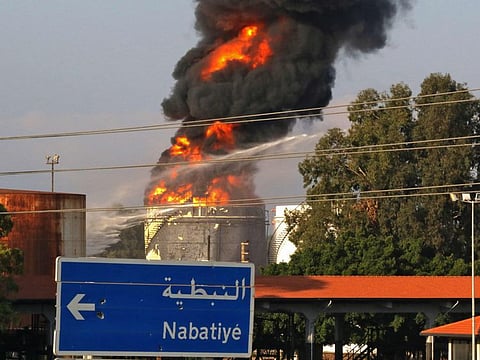Firefighters contain blaze at Lebanon fuel storage tank
No report of casualties at facility some 50km south of Beirut

Beirut: Firefighters contained a blaze at a gasoline storage tank in southern Lebanon on Monday, the energy minister said, the latest blow to a nation grappling with a deep economic crisis and a crippling fuel and power shortages.
There were no immediate reports of casualties in the fire at the Zahrani oil facility on the Mediterranean coast. A witness said the fire, which had sent a huge column of smoke into the sky, appeared to have been put out.
“The fire has been contained,” Energy Minister Walid Fayad, said, according to a statement on Twitter published by the prime minister’s office, saying he had requested a report on the cause of the fire that struck a tank with fuel belonging to Lebanon’s army.
A security source earlier told Reuters that nearby storage tanks were being cooled to stop the blaze spreading and it was diverting traffic away from the facility in a sparsely-populated area.
The facility at Zahrani, around 8 km (5 miles) south of the city of Sidon, houses one of the country’s main power stations.
Lebanon, which is in the throes of an economic meltdown, has been hit by a string of calamities including the catastrophic chemicals explosion at Beirut port last year which killed more than 200 people and devastated swathes of the city.
At the weekend, fuel shortages led the country’s two biggest power plants - the one in Zahrani and another in Deir Ammar in the north - to shut down completely, adding to the hardship of Lebanese who have struggled with meagre supplies of state-generated power for months and often face long queues for vehicle fuel.
The energy ministry had said on Sunday that power was being restored to the levels before the blackout, after the Lebanese army provided 6,000 kilolitres of gas oil to Zahrani and Deir Ammar power plants.
The World Bank has called Lebanon’s economic crisis one of the deepest depressions of modern history. Three quarters of its population have been plunged into poverty and the currency has lost 90% of its value in the past two years.
Lebanese have had to increasingly rely on private generators for power, with expensive fuel oil bills, as the state electricity company provided a few if any hours of service a day to their districts.








